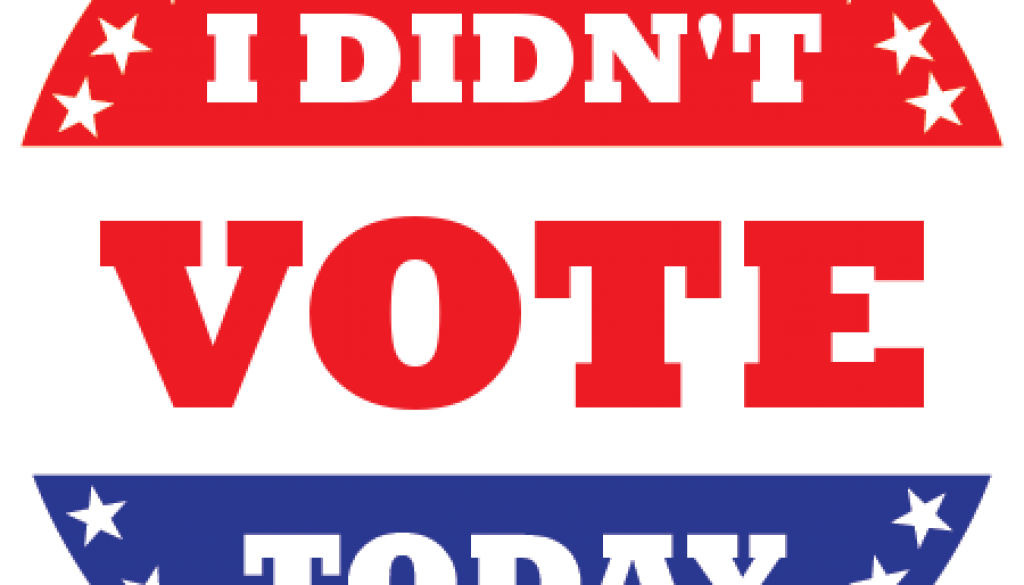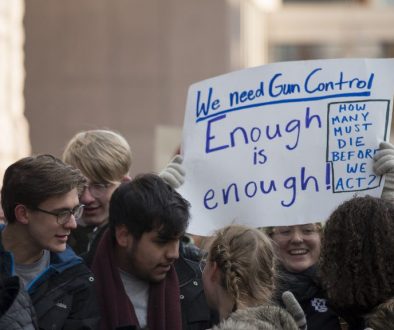Voting does not make you virtuous

Voting, like everything else, should be a matter of personal preference. Unfortunately though, sometimes sporting an “I Voted” sticker doesn’t quite satisfy people’s need for virtue-signalling, and they need to take it to the next level: vote-shaming.
Here are some common (and demonstrably refutable) claims about voting:
“If you don’t vote, you can’t complain.”
Putting aside the arrogant and condescending nature of this statement, the claim is totally illogical. If a robber approached you and demanded that you hand over either your wallet or your car keys, and then takes your wallet when you refuse to comply, at what point during that interaction did you “give up” your right to complain?
Forcing a selection on someone in any other scenario would be considered unacceptable, and voting should not be any different. Given the dessert choice of rat poison or anthrax, no one would fault you for saying “I’ll pass, thanks.”
No, refusing to choose a lesser evil does not mean you forfeit your right to express your dissatisfaction. Sadly, many voters are so indoctrinated into the process that they forget that if they’re voting in self-defense, they still have every right to complain about their would-be oppressors. They’re so swept up in the game that when their candidate loses, they believe in the legitimacy of the the winning candidate to rule over them.
The non-voter has every right to complain, as they simply refuse to take part in a game they know to be rigged.
“Voting is your civic duty”
In reality, most voting is essentially an attempt to use the power of government to impose one’s preferences onto someone else. The idea that we are somehow obligated to impose our will on strangers in this way is absurd.
Even worse, the secret ballot practice ensures that no one can be aware of who is oppressing them. If a person didn’t have the protection of the secret ballot and had to be open about their intentions to take money or property from others, they’d be far less likely to do so.
“You want to set a good example for your children, right?”
People raise their children in different ways, but blind obedience to authority has generally not proven to be a positive lesson that parents can pass along to their kids. We’re all happy to see young people “thinking outside the box”, but when it comes to politics, they’re expected to line up and do as they’re told.
For those of us who don’t see virtue in blind obedience, our children will at the very least experience an alternative viewpoint.
“Sometimes you have to vote for the lesser of two evils.”
Not voting for any evil actually sounds much better.
Conclusion
Regardless of one’s political leanings, one thing is certain: the process of voting moves the focus away from what individuals can do when working together voluntarily, and places it on politicians and what they can impose on others by force. By accepting this system and its outcomes, power is shifted from bottom-up initiatives to top-down policies.
The next phase in societal evolution requires the rejection of violence as an acceptable means of forward progress. Once enough people recognize the inherent violence of government and the immorality of democracy and all its other forms, a predominance of peaceful cooperation will become inevitable.
In the meantime, abstaining from voting as a rejection of a rigged, immoral system is a completely moral option.




November 8, 2018 @ 11:15 am
This is a fascinating and valid viewpoint, indeed. I voted Logitarian, actually. Keep up the excellent posts!
November 8, 2018 @ 12:01 pm
Very interesting reading. makes some sense does it not.
November 8, 2018 @ 12:12 pm
Your feedback is appreciated. More food for thought: voting creates dangerously false dichotomies. For example: “Vote for someone who will increase the education budget by 20%, or their opponent who will increase it by 30%.” As soon as the question is posed this way, we’re all now under two new assumptions: 1) a single person holds the key to solving education issues, and it’s one of these two candidates, and 2) regardless of the candidate, the solution to education is more money. All other ideas which would cost vastly less money (such as Montessori education) are instantly thrown out of the discussion, as voters’ selections are narrowed down to two simplistic options.
November 13, 2018 @ 11:25 pm
Thanks for the thought provoking read on the topic. You make a strong case for the morality of not voting. There is a lot of virtue-signaling in the ‘vote-shaming’ as you mentioned, which is generally sad to see.
The act of voting may be just that, just enough action to feel like the individual is contributing to society. “I did my part.” I believe about half of the population of the US votes at this time. ~56% according to this source: http://www.pewresearch.org/fact-tank/2018/05/21/u-s-voter-turnout-trails-most-developed-countries/
Being a free individual requires many things, among them: thinking, responsibility, and imminent risk mitigation. It may be too much to ask of the average person to take this on when the alternative is to fill in a scan-tron once every two years in exchange for the current system.
Playing Devil’s Advocate with a twisted question: Would you vote for the abolition of the democratic election system in exchange for individual autonomy?
November 13, 2018 @ 11:30 pm
“Would you vote for the abolition of the democratic election system in exchange for individual autonomy?”
This supposes that a majority-rule voting process would somehow allow full minority rule (which is an odd concept), but in that case it would make sense to vote for autonomy if such an objective, self-destructive voting opportunity were to exist.
November 13, 2018 @ 11:58 pm
It was a twisted question. What it reveals is interesting to me. Given certain criteria, a vote could be warranted. And I believe it could be argued that in this case, voting for individual autonomy, is for the moral reason to reduce/eliminate the use of violence by a ruling mob.
Much in the same way, if all voters stop voting, while different in logistics (no ballots), it would signify a vote of sorts. Perhaps a vote of no confidence?
In a system where the majority rules, to dial back the government, would the majority of people be required to favor individual autonomy for it to become more of a reality?
November 14, 2018 @ 11:42 am
These are good questions. For practical purposes, voting in certain circumstances may appear to be the correct move. Lysander Spooner put it best by likening the ballot to a bullet: if one was forced into a war and given a gun, any actions they took to defend themselves would be simply out of self-preservation, and could not be construed as an endorsement of the situation into which they were forced.
In a powerful state, abstaining from a vote could signify such a vote of no confidence.
In a largely powerless state, abstaining from a vote is further indictment of the state’s irrelevance.
In an airplane facing a hijacking threat, a majority of armed passengers is not needed to prevent the attack; a small minority would be enough. Likewise a relatively small percentage of people in favor of individual autonomy would be sufficient to undermine the state.